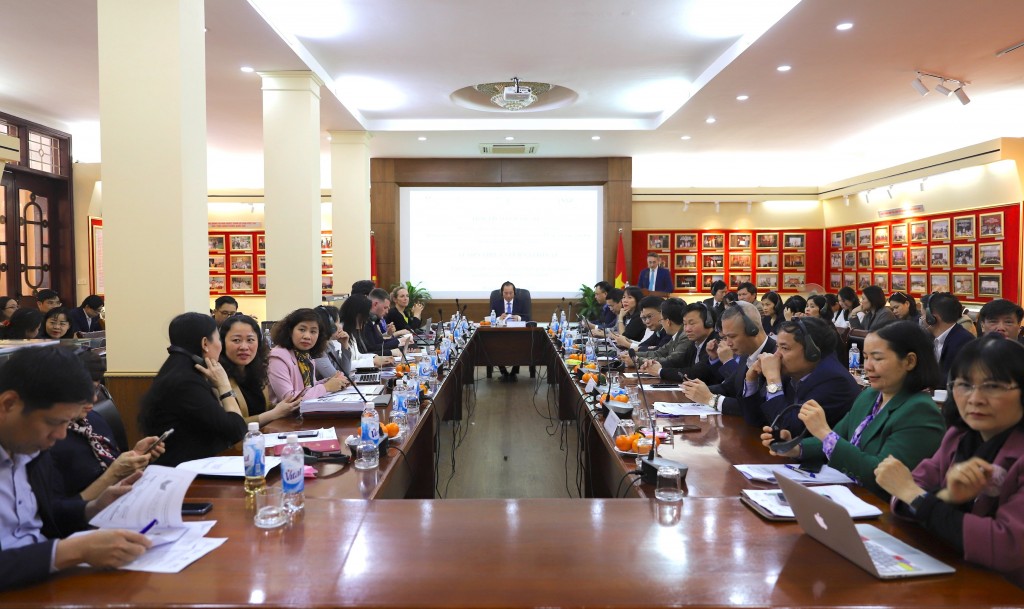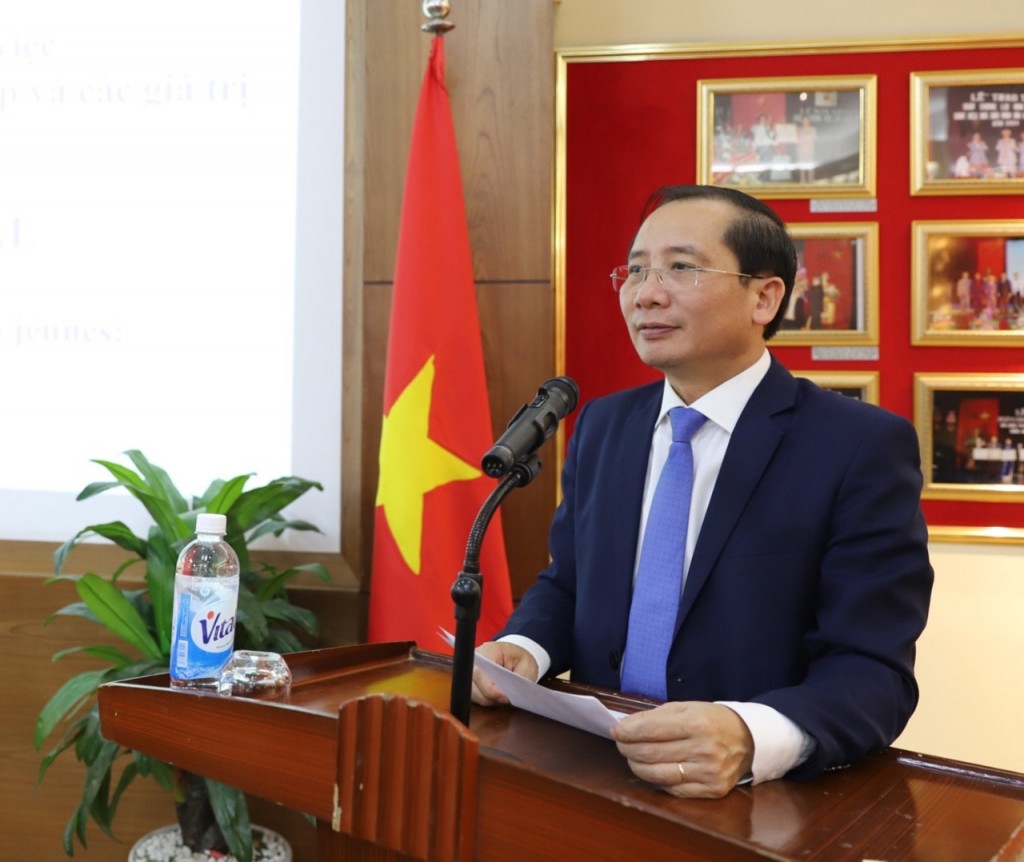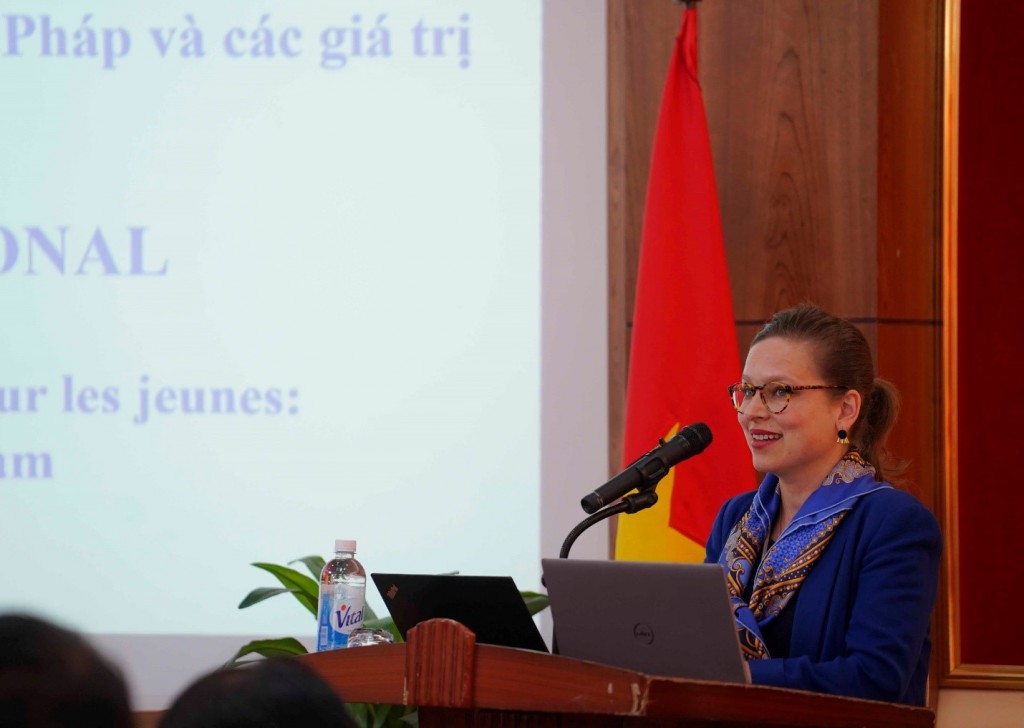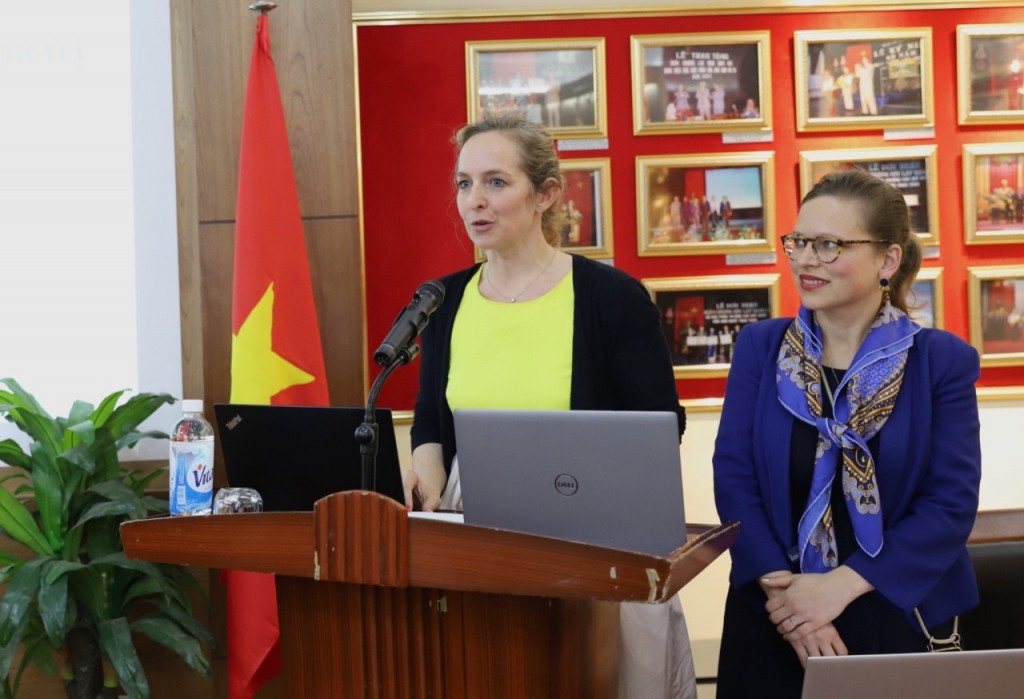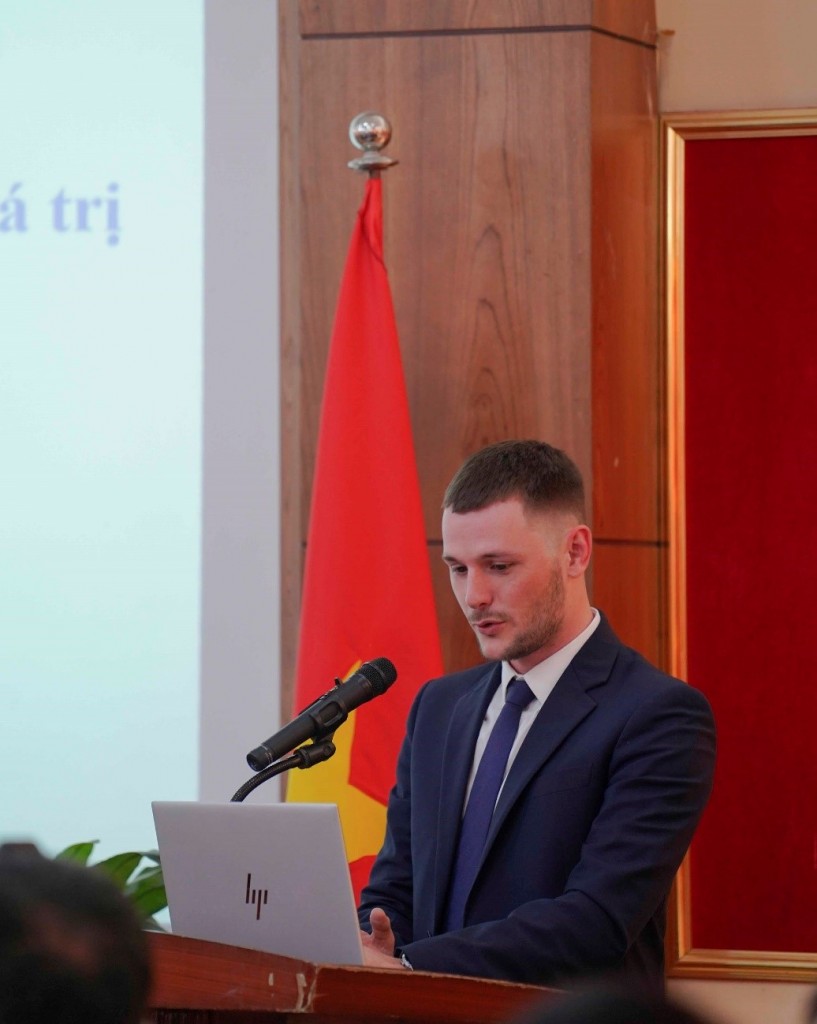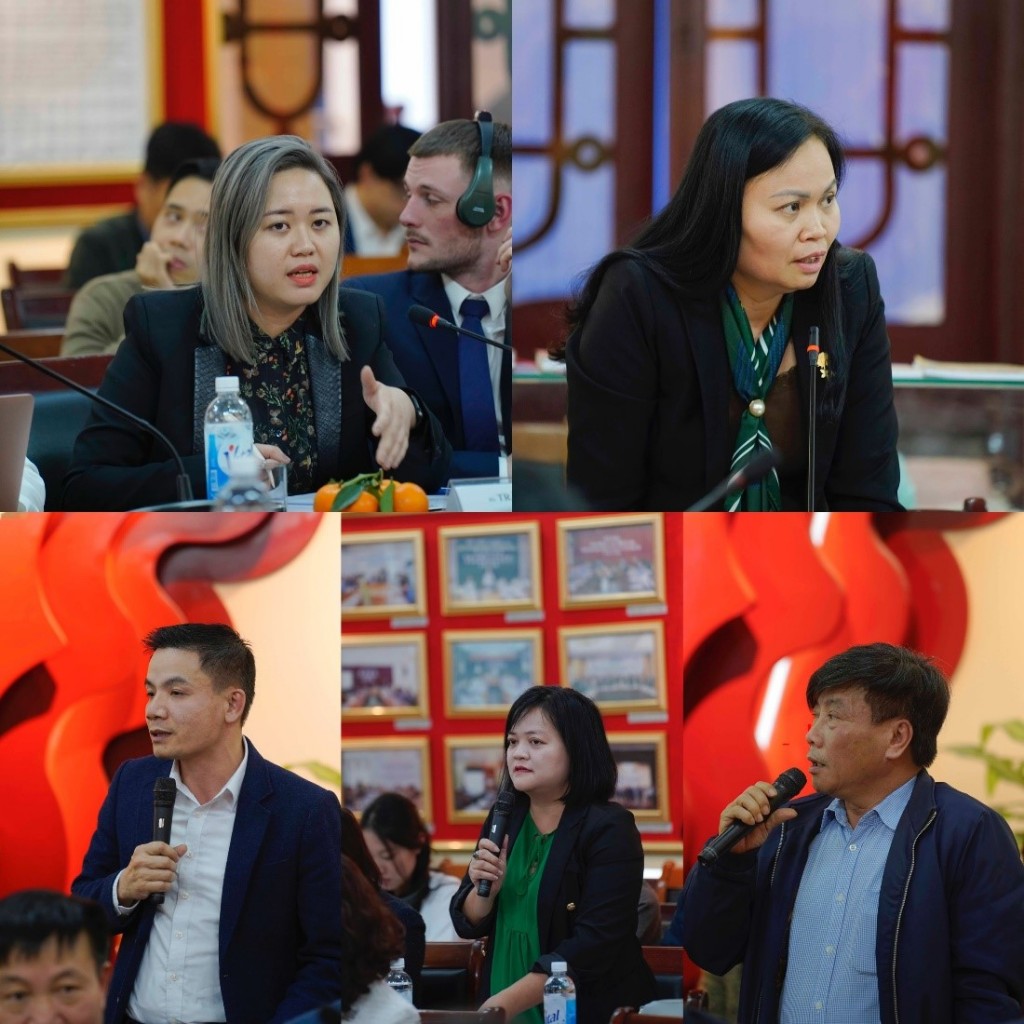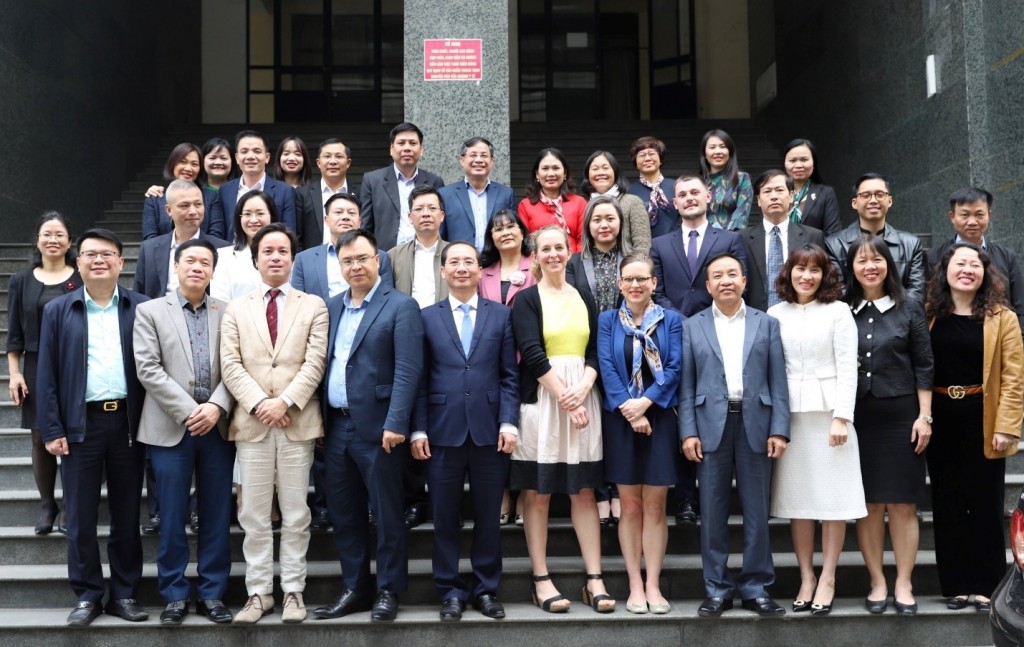On March 30, in Hanoi, the National Academy of Public Administration (NAPA) collaborated with the Directorate-General for Public Administration and Civil Service (DGAFP), the French National Institute of Public Services (INSP), and the French Embassy in Viet Nam to organize an international workshop titled “Attracting talented young people to work in the civil service: the experience of the French Republic and implications for Viet Nam”. Assoc. Prof. Dr. Nguyen Ba Chien, NAPA President, chaired the workshop.
International delegates were Mr. Béla Hégédus, Deputy Counselor for Cooperation and Cultural Activities Service, French Embassy in Viet Nam; Ms. Faustine Bentaberry, Director-General of the Cooperation, Partnerships, and Prospects Department, DGAFP; Ms. Sandra Senichault, International Project Manager, DGAFP; Mr. Alexandre Tran Chuong, Senior Project Manager and International Partner in Asia and the America Regions, INSP; Mr. Nathan Kuentz, INSP Student.
On the side of NAPA, there were Dr. Nguyen Dang Que, Dr. Lai Duc Vuong, and Assoc. Prof. Dr. Nguyen Quoc Suu, NAPA Vice Presidents; leaders of units, faculties, and departments under the Academy; staff, trainers, and representatives of online bridge points from NAPA Branch Campuses in Ho Chi Minh City, Central Region, and Tay Nguyen.
Delivering the opening remarks, NAPA President Nguyen Ba Chien welcomed international experts and delegates to the workshop. During the process of building and developing the civil service, Viet Nam has issued many policies to attract talented young people to work in the civil service. However, in the context of international integration and the impacts of the industrial revolution 4.0, Viet Nam’s civil service is facing many challenges. For example, experienced and qualified human resources have shifted to the private sector; the capacity of some public servants is still limited, not meeting the requirements of the job position; there is a lack of motivation to work; policies to attract, recruit and respect talented young human resources are not attractive.
NAPA is a national center for training public servants, playing the role of advising and assisting the Ministry of Home Affairs in the field of state administration and management. NAPA has been actively exchanging, researching, evaluating, cooperating with international partners, and learning from international experiences to innovate training programs and contents; advising the Ministry of Home Affairs to develop mechanisms and policies to attract talented young human resources for the civil service, actively contributing to the country’s rapid and sustainable development in the context of globalization and international integration and meeting the requirements of the fourth industrial revolution.
As a result of the exchanges, NAPA and the leading agencies of the French civil service agreed to organize seminars and workshops to realize the areas of collaboration. At the workshop, NAPA President suggested the delegates focus on sharing, exchanging and discussing the following areas: (1) The context of the fourth industrial revolution and requirements for attracting and using talented young human resources in the civil service; (2) The experience of the French Republic in attracting and using talented young human resources in the civil service; (3) The reality of attracting and using talented young human resources in the Vietnamese civil service: opportunities and challenges; (4) Proposals and suggestions to apply the experience of the French Republic in attracting and using talented young human resources in the current Vietnamese civil service.
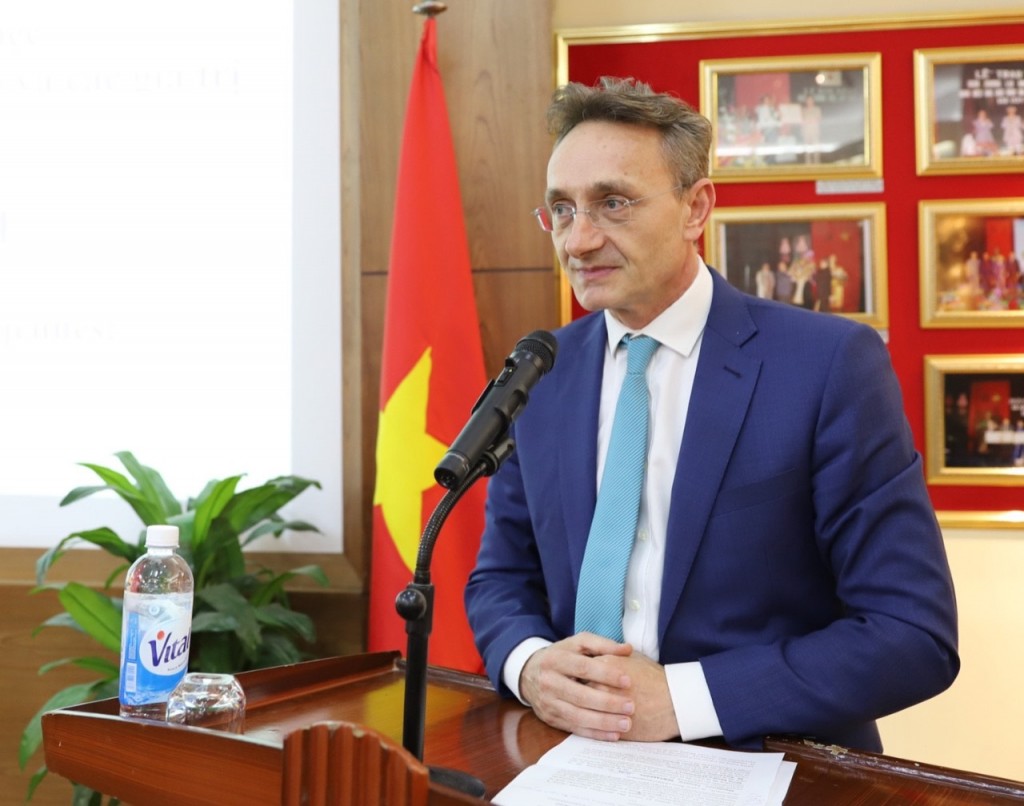
Mr. Béla Hégédus, Deputy Counselor for Cooperation and Cultural Activities Service, representative of the French Embassy in Viet Nam, delivering the opening remarks.
For his part, Mr. Béla Hégédus, Deputy Counselor for Cooperation and Cultural Activities Service, representative of the French Embassy in Viet Nam expressed his deep gratitude to the Academy’s leaders for warmly welcoming the delegation. According to him, the visit to the Academy aims to assess the collaboration progress between NAPA and DGAFP and INSP so that all parties can set up a cooperation schedule in the coming time, strengthening the areas of collaboration in the administrative field between Viet Nam and France. The workshop is an opportunity for the parties to engage in an in-depth exchange of expertise, experiences, and issues related to future civil service provision between the Vietnamese and French administrations. The topic of the workshop was proposed by the parties to address the problems, difficulties and challenges in recruiting and developing policies to attract and utilize Vietnamese and French talent. He hopes that practice and experience gained from France’s talent attraction and respect policies would help NAPA in particular, and Viet Nam’s civil service in general, to improve and achieve great results in the future, contributing to the successful cooperation of the parties.
With the presentation “How to attract, recruit, and retain talents in the civil service”, Ms. Faustine Bentaberry and Ms. Sandra Senichault, representatives of DGAFP, shared about the current French civil service. According to Ms. Faustine Bentaberry, the reality of the French civil service is currently facing many difficulties and challenges. There are three primary challenges: (1) The perception of young people today with the desire to find a job in the public or private sector, with a comparison of working in these two areas; the income disparity between the public and private sectors, coupled with the rigorous public sector entrance exams, making this sector not a priority for young people; the young generation is not interested in the career path in the public sector and wants to work in the private sector with creativity and high income; (2) The problem of re-staffing i.e. qualified public servants retire or resign, while the civil service cannot recruit talented human resources to replace them; (3) The issue of competition between the civil service and the private sector.
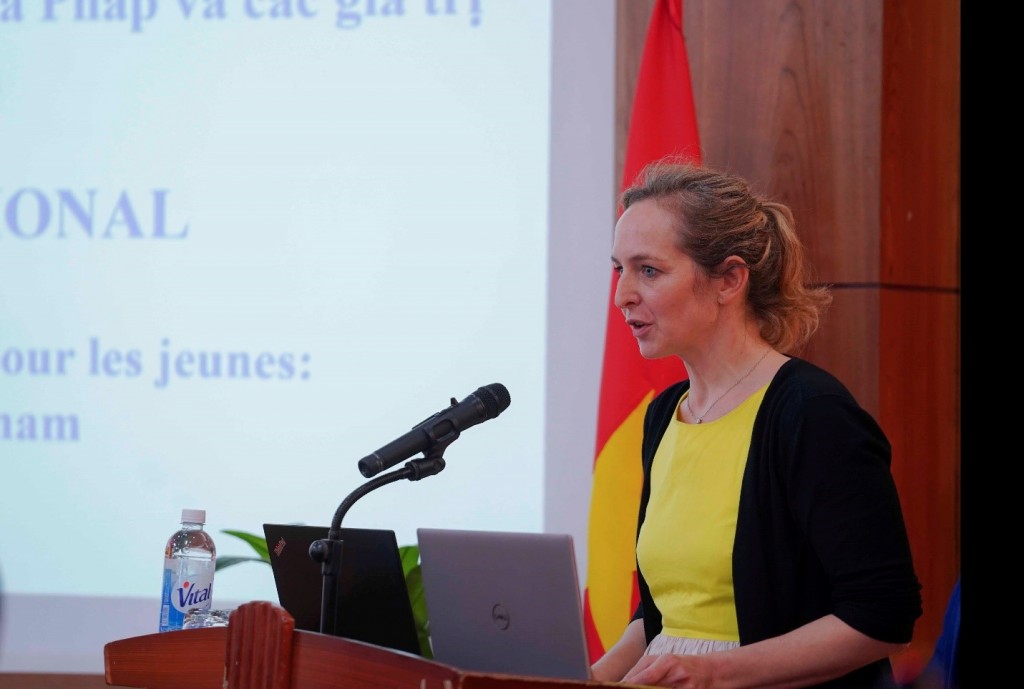
Ms. Faustine Bentaberry, Director-General of the Cooperation, Partnerships, and Prospects Department, DGAFP, presenting at the workshop.
Ms. Faustine Bentaberry shared what the DGAFP is implementing to increase the attractiveness of the civil service. For strategies in localities, DGAFP coordinates with relevant ministries to map out less attractive geographical areas; provide strategies to facilitate recruitment, retention, and promotion of public servant rotation; conduct experiments to improve the attractiveness of administrative activities in some localities. The presentation cited three provinces that are considered to be less attractive in attracting human resources, including the Somme department (Hauts-de-France region, in the North) and Essonne and Seine et Marne departments (Ile-de-France region, the Paris Region). To well implement the experiment, DGAFP asked OECD consultants (who provide technical assistance instruments) to conduct surveys and interviews with key HR heads on challenges and factors of the attractiveness of the civil service in the region. The OECD support provided insight into the attractiveness of the region and provided strategic and civil service recommendations to improve the attractiveness of the three selected pilot departments. In addition, campaigns such as “Employer Imprint” and “Discovering Public Service” are activities that the French civil service implements to attract talents to work in the civil service, which has achieved some success.
Following Ms. Faustine Bentaberry’s presentation, Ms. Sandra Senichault shared the “Activities towards the young generation”. In this presentation, she outlined three complementary schemes to attract young people to work in the public sector, such as offering preparation for the entrance exam to the senior civil service to students with good academic results and scholarships; introducing a specific recruitment process for six entrance exams to senior civil service; designing a dedicated platform for public servants to volunteer as mentors for young talents. Moreover, DGAFP also promotes equal opportunities for students at middle and high schools through partnerships with civil service training institutions and other practical initiatives.
Facing the requirements of the fourth industrial revolution, DGAFP has also provided directions and action programs to adapt to this transformation, such as: (1) The Interministerial Digital Directorate (DINUM) implements the talent program, which aims to develop careers in all administrative agencies to attract and retain digital transformation talent and experts to accompany public leaders in the successful implementation of digital transformation of the French Government; (2) There is a remuneration reference framework for 56 professions in the digital sector and information-communication systems in all state administrative agencies. This reference framework defines salaries for all job positions in the digital sector; (3) The program “Let’s share your digital talent” was launched by DINUM; (4) The “Common Interest Entrepreneurs” program was initiated to recruit technology experts in the field of digital design and digital law to experience new opportunities with public servants.
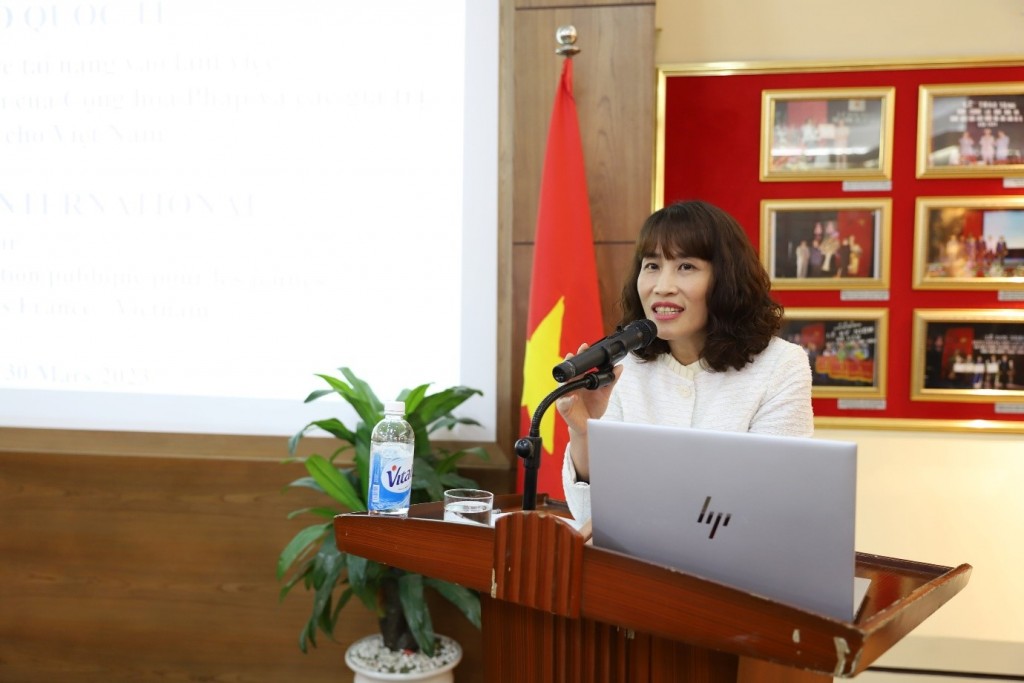
Assoc. Prof. Dr. Hoang Mai, Dean of the Faculty of Human Resources Management, presenting at the workshop.
At the workshop, Assoc. Prof. Dr. Hoang Mai, Dean of the Faculty of Human Resources Management of the Academy, delivered a presentation titled “Attracting and using talented young human resources in the Vietnamese civil service: opportunities, challenges, and solutions”. The presentation outlines the opportunities, challenges, and solutions for attracting and using talented young human resources in the Vietnamese civil service. In addition, Assoc. Prof. Dr Hoang Mai noted the guidelines and policies of the Party and State of Viet Nam through each period; in fact, many programs and policies have been implemented in the localities in the recruitment of talented young human resources.
Despite many guidelines and policies to attract and take advantage of talented young human resources, Viet Nam is still facing many difficulties and challenges in this task. Specifically, there is not yet a comprehensive and breakthrough national strategy for attracting and employing talented people; the provisions of the law have not yet fully institutionalized and synchronized with the Party’s policies on attracting and using talent; the policy of respecting talent has not offered clear incentives (salary, working environment, self-development opportunities in planning and appointment, etc.); the financial resources of the Government and localities are not commensurate with attracting and respecting talent. Accordingly, she proposed some solutions to attract and utilize talented young human resources to the Vietnamese civil service in the near future, such as: (1) Promulgating the National Strategy on Attracting and Utilizing Talent; (2) Identifying talented young human resources; (3) Developing criteria to identify talented young human resources with outstanding remuneration in terms of housing, salary, etc.; (4) Building the model of “Intellectual Village”, “Talent Incubator”; (5) Nurturing and training talent by sending them abroad for training and attending source classes…; (6) Implementing promotion and appointment according to a special process; (7) Mobilizing domestic resources while strengthening international cooperation in attracting and training young talent.
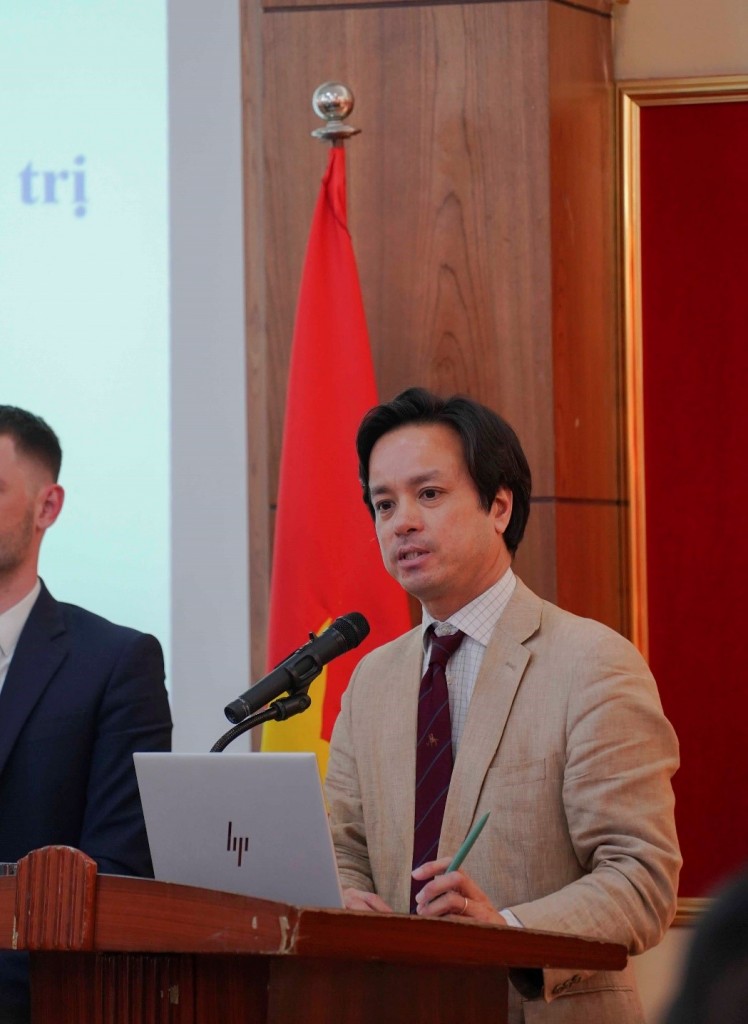
Mr. Alexandre Tran Chuong, Senior Project Manager and International Partner in Asia and the America Regions, INSP and Mr. Nathan Kuentz, INSP student, introducing INSP.
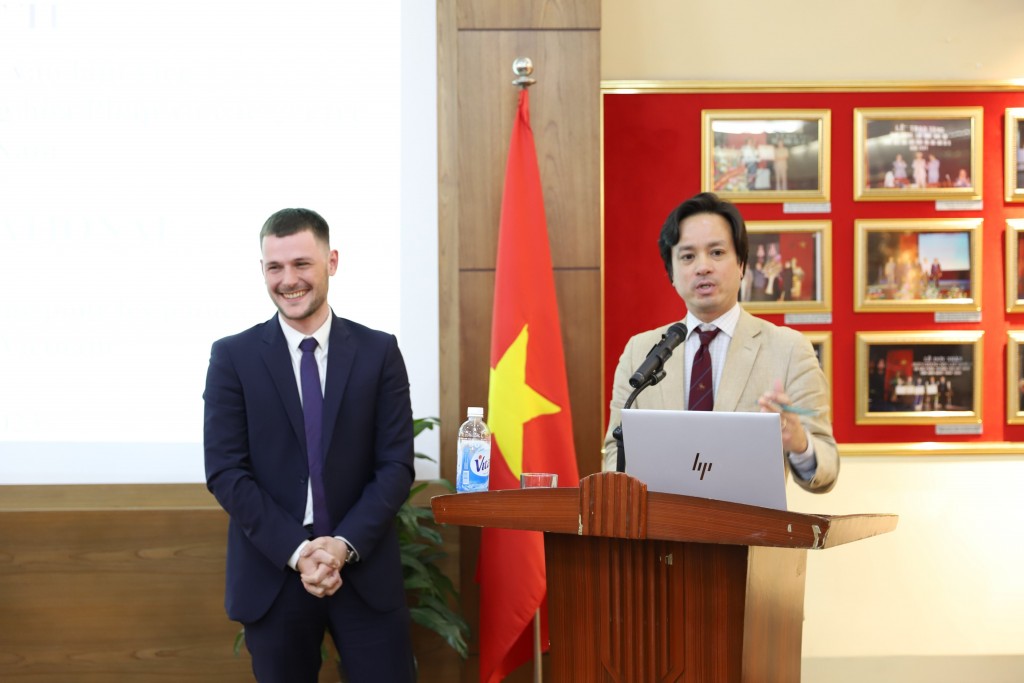
At the workshop, Mr. Alexandre Tran Chuong and INSP student Nathan Kuentz introduced the INSP and its role in human resource development. INSP, formerly known as the French National School of Administration (ENA), has had a tradition of collaborating with the Academy in the past. In recent years, NAPA – INSP collaboration activities have only been implemented on a small scale, such as visiting and working with INSP in France; sending a NAPA staff member to intern at the Department of International Cooperation of INSP. In 2022, in collaboration with the French Embassy in Viet Nam, INSP organized two online training courses for the Academy: one training course for public leaders and managers at local and central levels on “Decentralization, de-concentration, and modernization of the public service” in June 2022 and one training course to improve the capacity of trainers on “Digital Administration” in October 2022.
The workshop received many useful and practical questions and comments from the delegates about attracting and using talented young human resources of the two countries, which were fully addressed by academics and speakers of DGAFP, NAPA and INSP.
NAPA and INSP both hope that the two sides would sign a cooperation agreement on the following contents: cooperation in leadership and management training for the state administrative agencies, central and local non-business units; cooperation in training lecturers; exchange delegations of leaders, officials, and lecturers of the two training institutions; cooperation in organizing workshops and seminars and conducting joint research. In addition, through the support of the French Embassy in Viet Nam, the two sides will organize programs on improving the capacity of lecturers in leadership management in the context of volatility; national and local governance; modernization of the civil service; policy planning, implementation, and evaluation in the context of digital transformation and volatility; analytical and systems thinking skills.
Delivering the closing remarks, NAPA President Assoc. Prof. Dr. Nguyen Ba Chien expressed his sincere thanks to the delegates, academics, officials and trainers, especially international experts, for exchanging and sharing many contents during the workshop. He hopes that the knowledge and practical experience of France will bring practical meaning and can be applied to Viet Nam’s civil service, in order to build a modern Vietnamese civil service with sustainable development.


